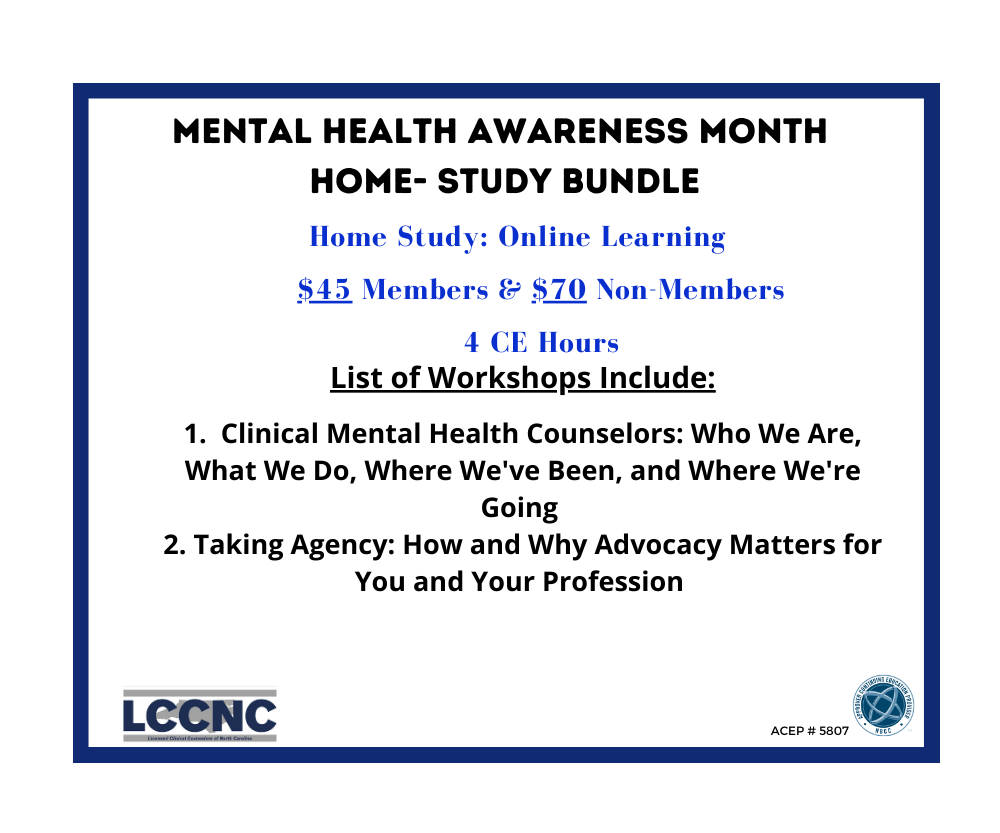Self-paced

For the person and the professional, the ability to have agency is important. This presentation will address how ongoing professional advocacy for the clinical mental health counseling profession is critical to every aspiring and practicing professional and the profession. From the state's oversight and process of granting professional licensure to the legislative and rulemaking process, participants will recognize the many influences and factors that impact our profession, our license scope of practice, and ultimately our ability to serve.
The workshop is designed to help participants:
1. Evaluate and determine the benefits of advocacy to the individual professional and the clinical mental health counseling profession.
2. Discuss impact of multiple systems, and the factors that pose potential impact and risks to to professional licensure, the profession, and scope of practice.
3. Establish the benefits of agency at both the macro level (a profession) and the micro level (as an individual professional).
4. Formulate understanding of individual and collective intention and motivation and the requisite foundational skills for advocacy.
5. Assess existing barriers to engage in advocacy and formulate options.
PRESENTER(S):Suzanne L. Walker, MS, CAS, LCMHC is currently finishing her 3rd tour as LCCNC’s Immediate Past President. a graduate of the University at Albany of NY with a MS in Counseling Psychology, Suzanne has been a licensed clinical mental health counselor for 38 years and is a retired US Army civilian after working at Fort Bragg, NC, Fort Riley, KS and South Korea. Suzanne specialized in co-occurring disorders; such as complex trauma and addiction. Her experience in behavioral healthcare provision and management ranges from being a director and manager of private practice clinics, county, state, and federal public government sectors to a provider and supervisor.As a military spouse of 3+ decades, Suzanne has experienced many challenges, culturally diverse experiences, and a wide-array of work experiences; all of which augmented her knowledge and appreciation for culture, diversity, and all aspects of the clinical mental health counseling profession. For the past 20 years. Suzanne has enjoyed volunteering on various LCCNC and AMHCA committee and leadership positions to include LCCNC President (yes, three times) and Advocacy Committee Chair for 10 years, and AMHCA 2016 President. In her spare time when she is not at the beck and call of her 9 month old Westie puppy, Suzanne enjoys her family and friends, nature, hikes, watercolors, festivals, travel, art and history.
Ashley Perkinson, LCCNC Lobbyist represents both statewide and national organizations at the North Carolina General Assembly. She has represented LCCNC since 2007. Ashley also currently serves on the Board of Trustees of the North Carolina Symphony. She also formerly served as president of the Phi Beta Kappa Association of Wake County, secretary of the Wake County Bar Association, and legislative chair of the North Carolina Bar Association's Constitutional Rights and Responsibilities Section. She is also a former board member of SafeChild. In 2011, Ashley was named by Triangle Business Journal as one of the Triangle's 40 Under 40. Ashley was recently recognized by North State Journal as one of North Carolina's top 25 lobbyists. Ashley is a graduate of the University of North Carolina at Chapel Hill School of Journalism and School of Law. Ashley enjoys providing government relations services to her clients.
Clinical Mental Health Counselors: Who We Are, What We Do, Where We've Been, and Where We're Going
EVENT:
The American Counseling Association declares that 'a counselor is a counselor is a counselor.' However, within the boarder counseling profession there are multiple counseling specialties, such as rehabilitation counselors, vocational/career counselors, school counselors, and clinical mental health counselors (CMHCs). What's a CMHC? What makes a CMHC similar or different from other mental health professionals? This training focuses on the unique professional identity of CMHCs. It exposes several myths about our profession, celebrates our long and fruitful journey towards excellence, and conveys a passionate vision for our professional future and a roadmap to professional
advocacy.
The workshop is designed to help participants:
1. Define clinical mental health counseling.
2. Review the scope of practice of CMHCs.
3. Explore the history of clinical mental health counseling.
4. Identify the few 'professional disparities' between clinical mental health counseling and allied therapeutic professions (i.e., clinical psychology, clinical social work, marriage and family therapy, psychiatry/psychiatric nursing) and how to overcome them.
PRESENTER:Dr. Aaron Norton PhD, LMHC, LMFT, CCMHC is a Licensed Mental Health Counselor and Licensed Marriage and Family Therapist with certifications in addictions, alcohol and drug counseling, rehabilitation counseling, clinical mental health counseling, trauma treatment, forensic mental health evaluation, forensic behavioral analysis, and forensic psychometry. He is an Assistant Professor of Instruction at the University of South Dept. of Mental Health Law & Policy and serves as Executive Director of the National Board of Forensic Evaluators, Southern Regional Director and Ethics Committee Liaison for the American Mental Health Counselors Association, and Chair of the Government Relations Committee for the Florida Mental Health Counselors Association. He is the Consulting Editor for AMHCA’s The Advocate Magazine. He has 20 years of experience as a psychotherapist and clinical supervisor specializing in lesbian, gay, bisexual, and transgender (LGBT) issues, cognitive behavioral therapy for anxiety and depressive disorders, and substance use treatment. He was awarded Mental Health Counselor of the Year by the American Mental Health Counselors Association in 2016, Counselor Educator of the Year by the Florida Mental Health Counselors Association in 2016, Researcher of the Year by the Florida Mental Health Counselors Association in 2019, and he was awarded AMHCA’s Public and Community Service Award in 2020. An experienced writer, presenter, and trainer, he has been published in several academic journals and professional magazines in the counseling profession.
PROVIDER INFORMATION:
LCCNC
605 N. Terrace Place
Morganton, NC 28655
(919) 714-9025
info@lpcanc.org
www.lccnc.org
